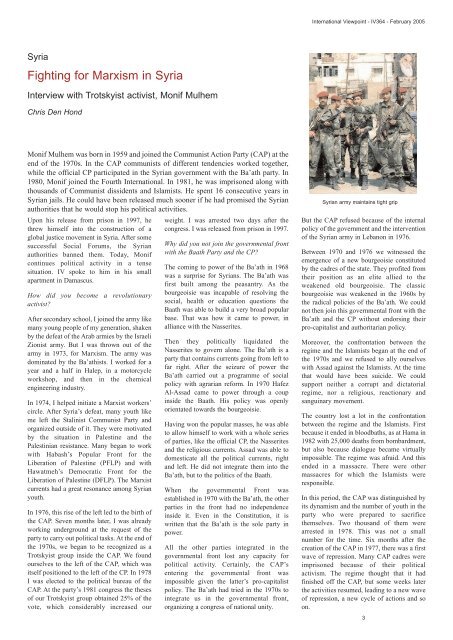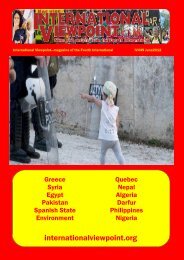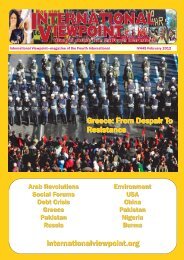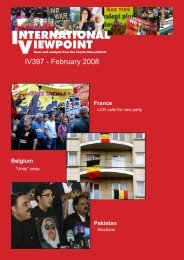IV 364 - International Viewpoint
IV 364 - International Viewpoint
IV 364 - International Viewpoint
Create successful ePaper yourself
Turn your PDF publications into a flip-book with our unique Google optimized e-Paper software.
Syria<br />
Fighting for Marxism in Syria<br />
Interview with Trotskyist activist, Monif Mulhem<br />
Chris Den Hond<br />
Monif Mulhem was born in 1959 and joined the Communist Action Party (CAP) at the<br />
end of the 1970s. In the CAP communists of different tendencies worked together,<br />
while the official CP participated in the Syrian government with the Ba’ath party. In<br />
1980, Monif joined the Fourth <strong>International</strong>. In 1981, he was imprisoned along with<br />
thousands of Communist dissidents and Islamists. He spent 16 consecutive years in<br />
Syrian jails. He could have been released much sooner if he had promised the Syrian<br />
authorities that he would stop his political activities.<br />
Upon his release from prison in 1997, he<br />
threw himself into the construction of a<br />
global justice movement in Syria. After some<br />
successful Social Forums, the Syrian<br />
authorities banned them. Today, Monif<br />
continues political activity in a tense<br />
situation. <strong>IV</strong> spoke to him in his small<br />
apartment in Damascus.<br />
How did you become a revolutionary<br />
activist?<br />
After secondary school, I joined the army like<br />
many young people of my generation, shaken<br />
by the defeat of the Arab armies by the Israeli<br />
Zionist army. But I was thrown out of the<br />
army in 1973, for Marxism. The army was<br />
dominated by the Ba’athists. I worked for a<br />
year and a half in Halep, in a motorcycle<br />
workshop, and then in the chemical<br />
engineering industry.<br />
In 1974, I helped initiate a Marxist workers’<br />
circle. After Syria’s defeat, many youth like<br />
me left the Stalinist Communist Party and<br />
organized outside of it. They were motivated<br />
by the situation in Palestine and the<br />
Palestinian resistance. Many began to work<br />
with Habash’s Popular Front for the<br />
Liberation of Palestine (PFLP) and with<br />
Hawatmeh’s Democratic Front for the<br />
Liberation of Palestine (DFLP). The Marxist<br />
currents had a great resonance among Syrian<br />
youth.<br />
In 1976, this rise of the left led to the birth of<br />
the CAP. Seven months later, I was already<br />
working underground at the request of the<br />
party to carry out political tasks. At the end of<br />
the 1970s, we began to be recognized as a<br />
Trotskyist group inside the CAP. We found<br />
ourselves to the left of the CAP, which was<br />
itself positioned to the left of the CP. In 1978<br />
I was elected to the political bureau of the<br />
CAP. At the party’s 1981 congress the theses<br />
of our Trotskyist group obtained 25% of the<br />
vote, which considerably increased our<br />
weight. I was arrested two days after the<br />
congress. I was released from prison in 1997.<br />
Why did you not join the governmental front<br />
with the Baath Party and the CP?<br />
The coming to power of the Ba’ath in 1968<br />
was a surprise for Syrians. The Ba’ath was<br />
first built among the peasantry. As the<br />
bourgeoisie was incapable of resolving the<br />
social, health or education questions the<br />
Baath was able to build a very broad popular<br />
base. That was how it came to power, in<br />
alliance with the Nasserites.<br />
Then they politically liquidated the<br />
Nasserites to govern alone. The Ba’ath is a<br />
party that contains currents going from left to<br />
far right. After the seizure of power the<br />
Ba’ath carried out a programme of social<br />
policy with agrarian reform. In 1970 Hafez<br />
Al-Assad came to power through a coup<br />
inside the Baath. His policy was openly<br />
orientated towards the bourgeoisie.<br />
Having won the popular masses, he was able<br />
to allow himself to work with a whole series<br />
of parties, like the official CP, the Nasserites<br />
and the religious currents. Assad was able to<br />
domesticate all the political currents, right<br />
and left. He did not integrate them into the<br />
Ba’ath, but to the politics of the Baath.<br />
When the governmental Front was<br />
established in 1970 with the Ba’ath, the other<br />
parties in the front had no independence<br />
inside it. Even in the Constitution, it is<br />
written that the Ba’ath is the sole party in<br />
power.<br />
All the other parties integrated in the<br />
governmental front lost any capacity for<br />
political activity. Certainly, the CAP’s<br />
entering the governmental front was<br />
impossible given the latter’s pro-capitalist<br />
policy. The Ba’ath had tried in the 1970s to<br />
integrate us in the governmental front,<br />
organizing a congress of national unity.<br />
<strong>International</strong> <strong>Viewpoint</strong> - <strong>IV</strong><strong>364</strong> - February 2005<br />
Syrian army maintains tight grip<br />
But the CAP refused because of the internal<br />
policy of the government and the intervention<br />
of the Syrian army in Lebanon in 1976.<br />
Between 1970 and 1976 we witnessed the<br />
emergence of a new bourgeoisie constituted<br />
by the cadres of the state. They profited from<br />
their position as an elite allied to the<br />
weakened old bourgeoisie. The classic<br />
bourgeoisie was weakened in the 1960s by<br />
the radical policies of the Ba’ath. We could<br />
not then join this governmental front with the<br />
Ba’ath and the CP without endorsing their<br />
pro-capitalist and authoritarian policy.<br />
Moreover, the confrontation between the<br />
regime and the Islamists began at the end of<br />
the 1970s and we refused to ally ourselves<br />
with Assad against the Islamists. At the time<br />
that would have been suicide. We could<br />
support neither a corrupt and dictatorial<br />
regime, nor a religious, reactionary and<br />
sanguinary movement.<br />
The country lost a lot in the confrontation<br />
between the regime and the Islamists. First<br />
because it ended in bloodbaths, as at Hama in<br />
1982 with 25,000 deaths from bombardment,<br />
but also because dialogue became virtually<br />
impossible. The regime was afraid. And this<br />
ended in a massacre. There were other<br />
massacres for which the Islamists were<br />
responsible.<br />
In this period, the CAP was distinguished by<br />
its dynamism and the number of youth in the<br />
party who were prepared to sacrifice<br />
themselves. Two thousand of them were<br />
arrested in 1978. This was not a small<br />
number for the time. Six months after the<br />
creation of the CAP in 1977, there was a first<br />
wave of repression. Many CAP cadres were<br />
imprisoned because of their political<br />
activism. The regime thought that it had<br />
finished off the CAP, but some weeks later<br />
the activities resumed, leading to a new wave<br />
of repression, a new cycle of actions and so<br />
on.<br />
3









